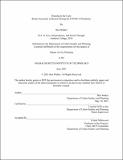Housing is the Cure: Renter Insecurity in Boston During the COVID-19 Pandemic
Author(s)
Walker, Ben
DownloadThesis PDF (5.258Mb)
Advisor
Levine, Jeff
Terms of use
Metadata
Show full item recordAbstract
The COVID-19 pandemic triggered a crisis of housing insecurity for Black, Latinx and immigrant Boston renters. This crisis magnified existing dynamics of systemic racial exploitation. It was also tempered by unprecedented expansions of renter protections across local, state, and federal levels of government, secured by the tenacious organizing of the housing justice movement. Given extreme levels of need and new renter protections, this thesis asks: how closely did patterns of rental housing insecurity during the first year of the COVID-19 pandemic follow previous racial disparities experienced by Boston renters? Using eviction records from Eastern Housing Court from March 2020 to March 2021, records of housing quality issues reported to the City of Boston’s 311 call center, and renter testimony gathered through surveying, this research assesses the extent to which COVID-19’s cumulative effects transformed tenant relationships with landlords, neighbors, and government. It finds that Boston’s communities of color continued to disproportionately experience common indicators of housing insecurity, though with less frequency and to perhaps to a lesser degree than before COVID-19. These findings demonstrate the need to expand, enhance, and solidify vigorous renter protections. Doing so, I argue, will begin to abate the deep housing insecurity experienced by Black and Brown renters in Boston.
Date issued
2021-06Department
Massachusetts Institute of Technology. Department of Urban Studies and PlanningPublisher
Massachusetts Institute of Technology